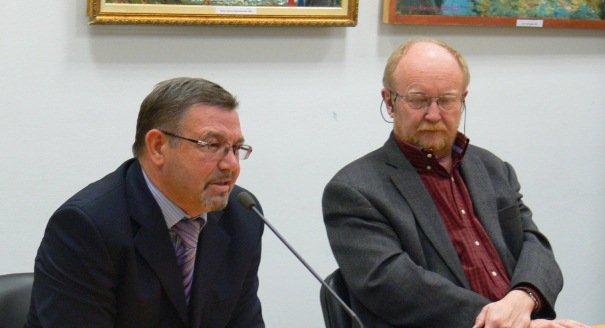Registration
Thank you!
You will receive an email confirming your registration.
IMGXYZ4065IMGZYXIt is still unclear what forces were behind the July terrorist attacks against Muslims clerics in the Russian republic of Tatarstan. Some have suggested that the reverberations of the Arab Spring, globalization, and internal political disputes may be among the possible reasons for the attempt on Tatarstan’s Mufti Ildus Faizov’s life and the murder of another prominent Muslim leader Valiulla Yakupov. Rafik Mukhametshin, head of Russian Islamic University in Kazan, Tatarstan, shared his perspective on these events and described the situation around religion in Tatarstan at an event at the Carnegie Moscow Center. Carnegie’s Alexey Malashenko moderated.
The July Terrorist Attacks and the Internal Divisions Among Muslims in Tatarstan
- A Possible Reason for the Terrorist Attacks: Mukhametshin said that radicalization is taking place inside Tatarstan’s Muslim community, and internal Islamic divisions are the most obvious reason for the July 2012 terrorist attacks on Faizov and Yakupov. He noted that these attacks were not entirely surprising, since there had been past disagreements in the Muslim community in the republic. These internal tensions became more evident in 2011 after Tatarstan’s Mufti Gusman Iskhakov (under whom the influence of Muslim radicals increased) was replaced by Faizov, an active proponent of traditional Islam.
- There Is No Underground: However, Mukhametshin suggested that there is no organized underground community of Muslim radicals in Tatarstan. On this issue, he is in agreement with Tatarstan’s authorities, he added.
Causes of Radicalization in Tatarstan and Ways to Counteract It
- The New Generation: Mukhametshin noted that Islamic radicalization in Tatarstan is primarily related to the emergence of a new generation of Muslim youth that is removed from tradition and adheres to a “distorted” and “simplified” value system.
- Saudi Education: These youth started studying in the Saudi Arabia as early as 1980s. The Saudi educational system steers students toward living in societies that are exclusively Muslim, Mukhametshin argued. Thus, these youth are unable to recognize a multiconfessional environment adequately once they return home. According to Mukhametshin, the problem is that “no one can demonstrate to the modern Muslim youth what traditional Islamic values are actually about.”
- Steps to Counteract Radicalization: According to Mukhametshin, sending young people to study in the Arab world right after high school is absolutely unacceptable. They should be able to go only after getting “basic religious education.” Russian universities should allow them to obtain these fundamentals of religious knowledge, Mukhametshin added, “which will give them the possibility for comparison and allow them to make the right conclusions.”
